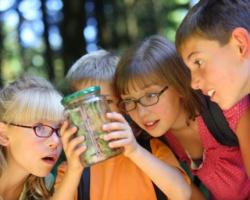Would you rather sleep in a sleeping bag out under the night sky or in a five-star hotel with room service?
Writer Paul Stevens once said camping is a form of play rather than work. As a challenge and exploration, as experimentation with new skills without the compulsion to make something, camping is a form of renewal. It is also one of many ways we put ourselves into a more receptive mode to hear, observe and respond to God.
Have you ever been to a summer camp sponsored by your church? What’s your favorite memory?
What is your favorite camp song?
What is your favorite camp food?
Big Debate question: S’mores—with peanut butter or without?
For many students, summer camp is the first experience away from home without their parents. Can you think of the first time you were away from your parents for a long time? Was it scary? Exhilarating? What did you learn about yourself?
Name some movies you like in which the main character is suddenly placed in a completely new environment? What happens?
Imagine being in a canoe for the first time. What was it like? Did you have to use one of those orange life vests? How did they smell? Did you have trouble getting it on the first time? Do you remember how to hold the paddle? How do you steer a canoe?
Imagine all of life is like a canoe on a lake. What is your life vest? Would you rather be the power at the front or steering at the back? Once you choose a position, who do you want on the other end of your life-canoe?
A hockey coach in Rocky River, Ohio, once said, “If you don’t set your shot, you’re just firing off a cannon in a canoe.” What would happen if you fired a canon while in a canoe? How is that like life?
Have you ever built a fire? What are some of the most important aspects of fire building?
Dig a fire pit. (Clear roots.)
Surround the pit with rocks.
Keep it small.
Only use dead wood. Don’t pull branches off live trees.
Keep water nearby.
Fill in the pit as though you were never there.
List some of your own instructions, and imagine this is your life: Assign a personal meaning to each item on your list.
Part of summer camp is experiencing nature. Some students who attend camp never have climbed a tree, swam in a lake, slept outdoors or have seen an unobscured view of the night sky. When was the last time you had a brand new experience unlike anything that’s ever happened to you before? Talk about it.
In the Gospel of Luke, the Pharisees tell Jesus to make His disciples shut up. Jesus tells them about a joy so great that even if He did silence the crowd, the stones would start to sing.
Picture a sunrise at summer camp. What do the stones say? What do we learn from the sunrise? What does the earth teach us?
Whether you are pitching a small tent in the backyard or going away to a church camp for a few weeks, camping is about getting away, shutting off, tuning out the noise we put in our own lives.
Read
Paul wants us to be aware that God is in the invisible places. How many things do you have on you right now that make noise or shine some kind of light? Check as a group, and put all these things in the middle of the circle. Why is it important to shut off sometimes?
Would you ever want to work at a summer camp? Could you shut off completely and live unplugged?
How does nature fit into your everyday life now?
One of the major lessons in most camping experiences is to live with minimum impact what does this mean? Would you rather be known as a person who left the world with a minimum impact or someone who changed the world?
Part of a camping experience is to live self-contained, to exist for multiple days with only what you have on you and in your backpack. What is the smallest you have ever lived? What would you take with you if you had to leave home forever and all you could take was a backpack?
Camping is about learning to become part of your surroundings rather than be dominated by them. In what ways are you dominated by the world around you? How do you keep that from controlling your life?
One of the greatest architects of all time is a man named Frank Lloyd Wright. He is famous for incorporating nature into his buildings…the most famous of which is probably a home called Fallingwater. It is a house built into the side of a waterfall. Wright once said this:
“God is the great mysterious motivator of what we call nature, and it has often been said by philosophers, that nature is the will of God. And I prefer to say that nature is the only body of God that we shall ever see.”
Do you agree? Is the way we learn to live with (or within) nature the way we learn to live with (or within) God? How so?




